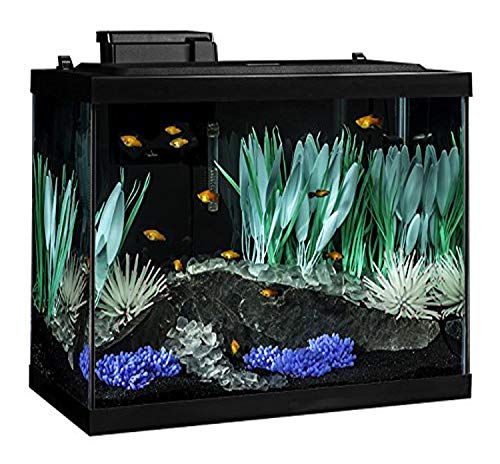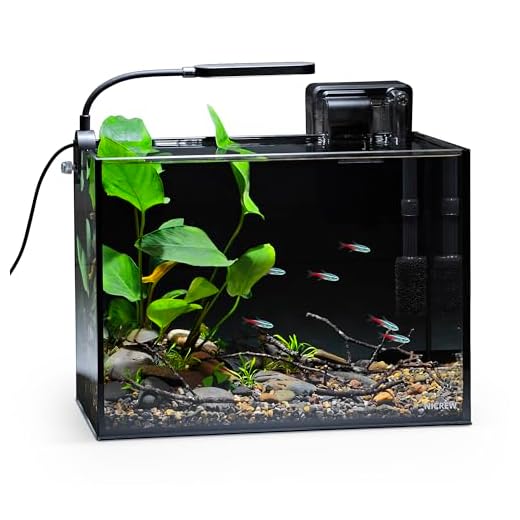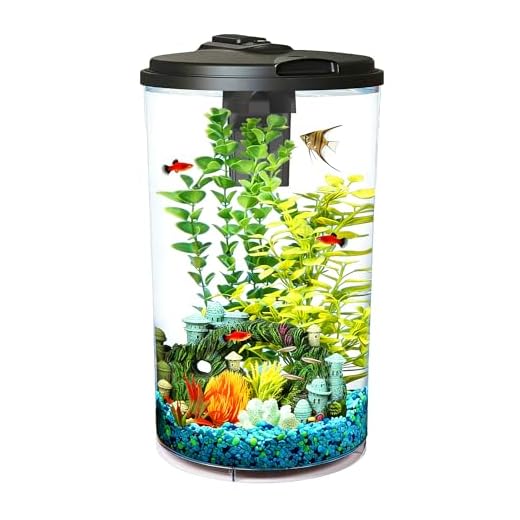Reef
Blog
Do betta fish grow in bigger tanks

Betta fish, also known as Siamese fighting fish, are popular pets known for their vibrant colors and long flowing fins. Many pet owners wonder whether the size of the tank can affect the growth and health of these beautiful fish. While betta fish can survive in small tanks, providing them with a bigger tank can have numerous benefits for their overall well-being.
One of the main advantages of keeping betta fish in larger tanks is the ample swimming space it provides. In the wild, bettas are accustomed to having a large area to explore and swim freely. A small tank can restrict their movement and cause stress. On the other hand, a spacious tank allows bettas to exercise, leading to stronger fins and overall better physical health.
Furthermore, bigger tanks offer more stable water conditions. Betta fish are sensitive to changes in water temperature, pH, and ammonia levels. A larger tank has a higher volume of water, which makes it easier to maintain a stable environment. This stability in water conditions promotes the growth of bettas and helps prevent stress-related illnesses.
Additionally, larger tanks allow for the installation of proper filtration systems.
A filtration system helps remove harmful waste and toxins from the tank, ensuring clean and healthy water for the betta fish. In a smaller tank, the limited space may not accommodate a suitable filtration system, which can lead to poor water quality and negatively impact the growth and development of bettas.
Why Bigger Tanks are Better for Betta Fish
Betta fish, also known as Siamese fighting fish, are a popular choice for aquarium enthusiasts due to their vibrant colors and long flowing fins. When it comes to providing the best living environment for these beautiful creatures, the size of the tank plays a crucial role in their overall well-being.
1. Ample Space for Exercise
Bigger tanks offer more space for betta fish to swim around, providing them with the opportunity to exercise. In smaller tanks, bettas are often limited in their movements, which can lead to stress and physical health problems. With a larger tank, bettas can display their natural behaviors and have more room to explore, promoting their overall health and happiness.
2. Stable Water Conditions
A larger tank has a higher volume of water, which helps to maintain stable water conditions. Water parameters such as temperature, pH levels, and ammonia concentration are less likely to fluctuate in a larger tank, creating a more stable and healthier environment for betta fish. This stability reduces the chances of stress-related illnesses and increases the lifespan of the fish.
3. Better Filtration and Oxygenation
With a bigger tank, it is easier to install a more powerful filtration system. This ensures that the water remains clean and free from harmful toxins, providing optimal conditions for the betta fish. Additionally, a larger tank allows for better oxygenation, as the larger surface area facilitates efficient gas exchange, promoting the overall health of the fish.
4. Social Compatibility
Bigger tanks provide betta fish with more space to establish their territories and reduce aggression when kept with other fish. The additional space minimizes the chances of territorial disputes and increases the chances of successful tankmate associations. Proper introductions and monitoring are still necessary, but a larger tank can significantly improve the social compatibility of betta fish.
In conclusion, bigger tanks are indeed better for betta fish. They provide more space for exercise, help maintain stable water conditions, improve filtration and oxygenation, and enhance the social compatibility of these beautiful fish. If you want to give your betta fish the best possible living environment, consider investing in a larger tank.
Improved Growth and Development
Providing betta fish with bigger tanks can greatly improve their growth and development. A larger tank offers more space for the fish to swim and exercise, which can lead to stronger muscles and overall better health. Bettas housed in smaller tanks often have limited space to move around, which can hinder their growth and lead to stunted development.
In a bigger tank, betta fish have more room to explore their environment, which can help stimulate their cognitive abilities and natural behaviors. They can swim freely and display their vibrant colors, which can enhance their overall physical appearance.
Moreover, larger tanks offer more stable water conditions and a better filtration system. This can result in cleaner water with fewer toxins and contaminants, creating a healthier environment for the fish to thrive. Cleaner water quality can also promote the growth of beneficial bacteria, which can help break down waste and improve water chemistry.
Bigger tanks also provide betta fish with more space for the installation of accessories such as live plants, hiding spots, and decorations. These additions not only enhance the aesthetic appeal of the tank but also provide stimulation and enrichment for the fish. They can explore and interact with their environment, reducing stress levels and encouraging natural behaviors.
Overall, providing betta fish with larger tanks promotes improved growth, development, and overall well-being. It allows them to live in a more natural and stimulating environment, leading to healthier and happier fish. Remember to properly cycle and maintain the tank, and monitor water parameters regularly to ensure optimal conditions for your betta fish.
Enhanced Water Quality
Water quality is an important factor in the growth and overall well-being of betta fish. When you provide a larger tank for your betta fish, you have the opportunity to enhance and maintain the water quality effectively. The increased volume of water in a larger tank dilutes waste and toxins, making it easier to maintain a healthy environment for your fish.
1. Filtration
In a larger tank, you can install a more powerful filtration system that effectively removes waste and debris from the water. A good filter will circulate and oxygenate the water, creating a healthier and more balanced environment for your fish. Regular water changes and cleaning the filter media will help further enhance the water quality.
2. Beneficial Bacteria
In a larger tank, there is more surface area for beneficial bacteria to colonize. These bacteria help in breaking down harmful ammonia and nitrites, turning them into less toxic nitrates. The increased water volume also provides more stability in terms of temperature and chemical balance, which is beneficial for the growth and health of betta fish.
Moreover, the larger tank size allows for the addition of live plants, which can further enhance the water quality. Plants absorb nitrates as a nutrient source, which helps to reduce their levels in the water.
- Plants also provide natural hiding places for betta fish, helping to reduce stress levels.
- They oxygenate the water and compete with algae for nutrients, preventing excessive algae growth.
- The roots of the plants also provide surface area for beneficial bacteria to grow.
Overall, the enhanced water quality in a larger tank creates a healthier and more conducive environment for the growth and well-being of betta fish.
Increased Swimming Space
One of the main advantages of providing a betta fish with a larger tank is the increased swimming space. In the wild, betta fish are used to having vast areas to explore and swim around. Keeping them in small tanks can restrict their movements and cause them stress and frustration.
When betta fish have access to a larger tank, they are able to exercise and stretch their fins more freely. This helps to strengthen their muscles and improve overall health. Additionally, betta fish are naturally curious and enjoy investigating their surroundings. A bigger tank allows them to explore and interact with their environment, keeping them mentally stimulated.
Providing betta fish with a bigger tank not only promotes their physical and mental well-being, but it also allows for the inclusion of more enrichment items. These can include plants, decorations, and hiding spots. Having a variety of items in their tank gives betta fish opportunities for play and exploration.
It is important to note that while larger tanks provide more space for betta fish to swim, they still require regular maintenance and care. Keeping the water clean and providing appropriate filtration and heating is crucial to their health and happiness.
| Advantages of Increased Swimming Space: |
| 1. Allows betta fish to exercise and stretch their fins |
| 2. Promotes muscle strength and overall health |
| 3. Provides mental stimulation and environmental enrichment |
| 4. Allows for the inclusion of various items for play and exploration |
| 5. Requires regular maintenance and care for optimal health |
Reduced Stress Levels
Keeping betta fish in larger tanks can significantly reduce their stress levels. In smaller tanks, bettas may feel cramped and confined, leading to higher stress levels. When bettas have more space to swim and explore, they can exhibit natural behavior, which can help reduce stress.
Additionally, larger tanks provide better water quality and stability. With more water volume, the tank environment can be better regulated, resulting in cleaner and healthier water for the betta fish. Clean water is essential for the overall well-being of bettas and can contribute to reducing stress.
Moreover, in larger tanks, bettas have the opportunity to establish territories and hideaway spots. This can make them feel more secure and less stressed. When bettas feel safe and comfortable in their environment, they are less likely to exhibit signs of stress, such as fin damage, decreased appetite, or lethargy.
In summary, providing betta fish with larger tanks can lead to reduced stress levels. The increased space, improved water quality, and the ability to establish territories can contribute to a healthier and happier betta fish.
Q&A
Do betta fish grow bigger in larger tanks?
Yes, betta fish have the potential to grow larger in larger tanks. This is because larger tanks provide more swimming space and can encourage more natural movement and exercise, which can lead to healthier and larger fish.
What size tank is ideal for betta fish growth?
For optimal betta fish growth, a tank size of at least 5 gallons is recommended. This provides enough space for the fish to swim and roam around, allowing them to grow to their full potential.
Will my betta fish grow to its full size in a small tank?
No, betta fish are less likely to reach their full size in a small tank. Limited space can restrict their growth and mobility, leading to stunted growth. It is important to provide a larger tank to promote healthy and proper growth.
Can betta fish suffer from stunted growth in small tanks?
Yes, betta fish can suffer from stunted growth in small tanks. When their swimming space is limited, it can cause stress and hinder their growth potential. Providing a larger tank can help prevent stunted growth and promote their overall health and well-being.
Is it true that betta fish need a larger tank to grow brightly colored?
While a larger tank does not directly affect the coloration of betta fish, it can indirectly contribute to their overall health and well-being, which in turn can enhance their natural vibrant colors. In a larger tank, betta fish have more space to exercise and thrive, leading to brighter and more vibrant appearances.
Do betta fish grow bigger in bigger tanks?
Yes, betta fish can grow bigger in bigger tanks. A larger tank provides more swimming space and allows the fish to exercise more, which can promote healthy growth.







